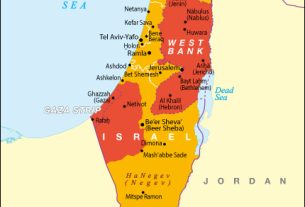Red Cross Evacuates Over 1,300 DR Congo Security Personnel from Rebel-Held Goma
The International Committee of the Red Cross (ICRC) announced Thursday, May 15, that it had successfully evacuated more than 1,300 Congolese soldiers and police officers from Goma, a strategic city in eastern DR Congo now controlled by the M23 rebel group. M23, accused by UN experts of receiving backing from Rwanda, seized Goma in January amid renewed fighting in the long-standing conflict. Thousands have died, and around 2,000 security personnel reportedly sought refuge in UN peacekeeping (MONUSCO) bases. The ICRC said the complex operation involved negotiations with MONUSCO, the Congolese government, and M23, which blocked use of the Goma airport, necessitating a 2,000-kilometer overland evacuation to Kinshasa. (Le Monde / AFP)
Sudan: Surge in Abuses at Zamzam Displacement Camp
Killings, rapes, and enforced disappearances have escalated in the Zamzam camp for displaced persons in North Darfur, according to camp officials. Mohamed Khamis Douda, a spokesman for the camp administration, reported 31 rapes, 52 disappearances, and 173 deaths in just one week, citing data from a newly launched digital abuse-tracking platform. The platform faces challenges, however, as many displaced residents lack internet access or have sold their phones amid displacement, limiting reporting. The violence is primarily attributed to elements of the Rapid Support Forces (RSF). (Sudan Tribune)
Chad: Former Prime Minister Allegedly Abducted
Chad’s former Prime Minister Succes Masra was allegedly abducted by military forces early Friday morning from his residence, which also serves as headquarters for his political party, Les Transformateurs. The incident follows May’s presidential election, where Masra ran against incumbent President Mahamat Idriss Déby Itno, who took power after his father’s death in 2021. Observers have criticized the election as lacking credibility amid increasing repression of opposition figures. (AFP)
Deadly Ethnic Clash in Southwest Chad Leaves 35 Dead
At least 35 people were killed Wednesday in a violent clash in Chad’s Logone-Occidental region, the government confirmed. The conflict, reportedly between Fulani nomadic herders and local Ngambaye farmers, centers on land demarcation disputes. The region has seen frequent violence linked to tensions between Muslim nomadic groups and Christian or animist farming communities. (AFP)
MSF Sounds Alarm Over Health Crisis in South Sudan
Doctors Without Borders (MSF) warned Thursday of a worsening humanitarian and health emergency in South Sudan, amid escalating conflict between government and opposition forces. Clashes in multiple states, including Jonglei and Upper Nile, have displaced more than 100,000 people and severely impacted medical infrastructure. MSF reported that health workers have fled and many facilities are now inoperable. (Radio Tamazuj)
Burkina Faso: Jihadists Raid Eastern City, Free Prisoners
Suspected jihadist fighters launched a coordinated attack Monday on the city of Diapaga in eastern Burkina Faso, freeing prisoners, destroying property, and causing widespread panic. The raid followed a similar large-scale assault a day earlier in Djibo, where dozens of civilians and soldiers were killed. The attackers reportedly arrived in large numbers on motorcycles, setting fire to shops and government buildings. (AFP)
Mali Junta Dissolves Political Parties Amid Growing Calls for Civilian Rule
Amid rising calls for a return to democracy, Mali’s ruling junta has dissolved all political parties following a rare protest in Bamako earlier this month. Analysts say the move signals a deepening authoritarian shift, mirroring similar actions by juntas in neighboring Burkina Faso and Niger. The decision followed recommendations from a pro-junta national assembly, which was widely boycotted by the opposition. (AFP)
Nigeria: Jihadists Using TikTok for Propaganda, Recruitment
Militants in Nigeria have turned to TikTok to disseminate propaganda, flaunting weapons, cash, and extremist rhetoric in livestreams. According to AFP, the shift from encrypted platforms like Telegram reflects a strategic move to engage younger audiences. Former fighters say the groups now prioritize visually engaging, interactive content. The trend coincides with a spike in violence, with over 100 people killed in April alone in Borno State. (AFP)
Nigeria Senate Launches Committee to Address Security Crisis
Nigeria’s Senate has formed a 20-member committee to organize a national security summit aimed at addressing the country’s persistent violence and instability. Senate President Godswill Akpabio announced the initiative Thursday, tasking the committee with drafting a strategic framework and submitting recommendations within two weeks. (Premium Times)
Sierra Leone-Guinea Border Tensions Resurface
Tensions reignited along the Sierra Leone-Guinea border after Guinean troops fired warning shots while attempting to enter Sokoma village near the contested Yenga area on April 28. The incursion triggered panic and displacement among local residents. The Yenga dispute, dating back to the 1990s, has persisted despite previous diplomatic efforts to resolve it. (RFI)
Gabon: Ousted President Ali Bongo Resettles in Angola
Former Gabonese President Ali Bongo Ondimba, who was ousted in a 2023 military coup, has left Gabon for Angola with his family following an agreement brokered by Angolan President João Lourenço, acting in his capacity as African Union chair. The Bongo family’s release had been a key demand of international bodies, including the AU. (AP)
Côte d’Ivoire: Tidjane Thiam Re-Elected Party Leader Amid Legal Battle
Despite stepping down days earlier, opposition leader Tidjane Thiam was re-elected Wednesday as head of Côte d’Ivoire’s Democratic Party (PDCI) with over 99% of the vote. Thiam, who has been barred from running in the upcoming presidential elections over dual citizenship concerns, also faces a legal challenge to his initial party leadership win. Political tensions are intensifying ahead of the October elections. (RFI)
South Africa: Investigators Expose Paid Political Campaigns by ‘Nano-Influencers’
A report by Daily Maverick has uncovered coordinated political campaigns on X (formerly Twitter) involving paid influencers tasked with boosting party visibility and manipulating public perception. These nano- and micro-influencers were paid to post coordinated praise of political actions, including opposition to a VAT increase, creating a false sense of grassroots support. Researchers warn that the tactic undermines digital transparency and authentic public discourse. (Daily Maverick)



